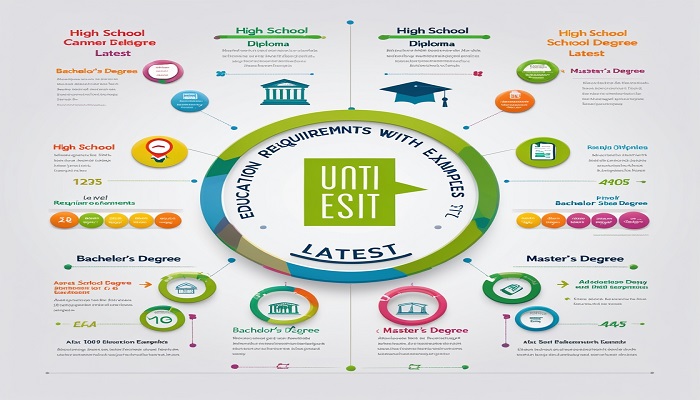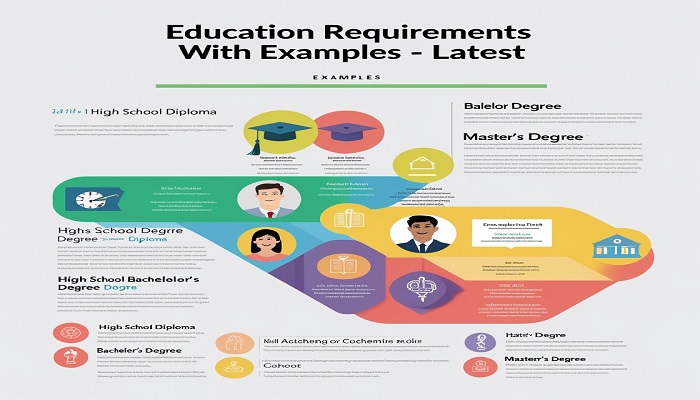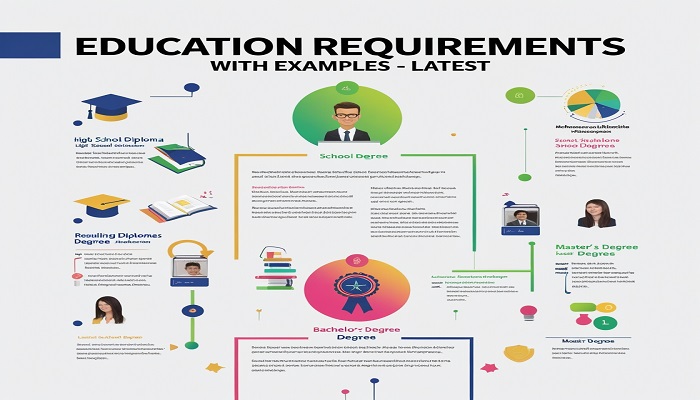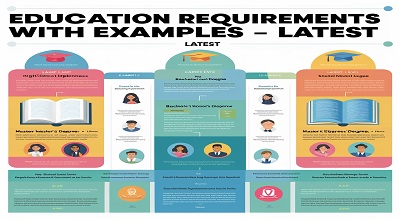Education Requirements
Education Requirements: Education is a fundamental pillar of society, shaping individuals and communities alike. As we delve into the education requirements across various fields, we will explore the latest trends, necessary qualifications, and examples that illustrate the diverse pathways available. This comprehensive article will cover the educational landscape, providing insights into different professions, the evolving nature of education, and the importance of lifelong learning.
Education is not just about acquiring knowledge; it is about preparing individuals for the challenges of the modern world. As industries evolve, so do the education requirements necessary to succeed in various fields. This article aims to provide a detailed overview of the latest education requirements across different professions, highlighting examples and trends that shape the educational landscape today.
Understanding Education Requirements
Definition of Education Requirements
Education requirements refer to the minimum level of education and training needed to qualify for a specific job or profession. These requirements can vary significantly depending on the field, ranging from high school diplomas to advanced degrees.
Importance of Education Requirements
Education requirements serve several critical functions:
- Standardization: They help establish a baseline of knowledge and skills necessary for specific roles.
- Quality Assurance: Ensuring that individuals possess the required qualifications helps maintain standards within professions.
- Career Advancement: Meeting educational requirements can open doors to promotions and new opportunities.

Education Requirements by Profession
Healthcare Professions
In the healthcare sector, education requirements are often stringent due to the critical nature of the work. For example:
- Doctors typically require a bachelor’s degree, followed by a medical degree (MD or DO), and several years of residency training.
- Nurses may need an associate’s degree in nursing (ADN) or a bachelor’s degree in nursing (BSN), along with passing the NCLEX-RN exam.
Education Sector
Teachers play a vital role in shaping future generations. Education requirements for teachers often include:
- A bachelor’s degree in education or a specific subject area.
- Completion of a teacher preparation program.
- State certification or licensure, which may involve passing exams.
Technology and IT
The technology sector is rapidly evolving, and education requirements reflect this dynamism:
- Software developers often hold a bachelor’s degree in computer science or a related field, though many successful developers are self-taught or have completed coding boot camps.
- Cybersecurity analysts may require a degree in information technology or cybersecurity, along with relevant certifications like CompTIA Security+.
Business and Management
In business, education requirements can vary widely:
- Managers typically need at least a bachelor’s degree in business administration or a related field, with many pursuing an MBA for higher-level positions.
- Accountants usually require a bachelor’s degree in accounting and must pass the CPA exam to become licensed.
Skilled Trades
Skilled trades often have different educational pathways:
- Electricians typically complete an apprenticeship program, which combines on-the-job training with classroom instruction.
- Plumbers also follow a similar route, often requiring a high school diploma and completion of an apprenticeship.

Examples of Education Requirements
Case Study: Nursing
Nursing is a profession with clear educational pathways. To become a registered nurse (RN), one must:
- Complete an accredited nursing program (ADN or BSN).
- Pass the NCLEX-RN exam.
- Obtain state licensure.
Case Study: Teaching
To become a teacher, candidates generally need:
- A bachelor’s degree in education or a specific subject.
- Completion of a student teaching internship.
- State certification, which may require passing exams.
Case Study: Software Development
Software developers can enter the field through various routes:
- A bachelor’s degree in computer science or software engineering.
- Coding boot camps that provide intensive training in programming languages.
- Self-taught skills through online resources and projects.
Case Study: Electricians
Electricians typically follow these steps:
- Complete a high school diploma or GED.
- Enroll in a technical school or apprenticeship program.
- Obtain a license by passing a state exam.
Case Study: Marketing Specialists
Marketing specialists often require:
- A bachelor’s degree in marketing, business, or communications.
- Experience through internships or entry-level positions.
- Certifications in digital marketing or analytics can enhance job prospects.

Trends in Education Requirements
Shift Towards Online Learning
The rise of online education has transformed how individuals meet their educational requirements. Many institutions now offer accredited online degrees, making education more accessible.
Emphasis on Soft Skills
Employers increasingly value soft skills such as communication, teamwork, and problem-solving. Educational programs are adapting to include these skills in their curricula.
Continuous Professional Development
In many fields, ongoing education is essential. Professionals are encouraged to pursue certifications and training throughout their careers to stay current with industry trends.
Challenges in Meeting Education Requirements
Accessibility Issues
Not everyone has equal access to educational resources. Geographic location, socioeconomic status, and other factors can create barriers to obtaining necessary qualifications.
Financial Barriers
The cost of education can be prohibitive. Many individuals struggle with student debt, which can deter them from pursuing higher education.
Evolving Job Market
As industries change, so do the education requirements. Professionals must be adaptable and willing to pursue additional training to remain competitive.

Conclusion
Education requirements are a crucial aspect of professional development, shaping the skills and knowledge necessary for success in various fields. As we navigate an ever-changing job market, understanding these requirements and the pathways to meet them is essential for individuals seeking to advance their careers. Lifelong learning and adaptability will be key in overcoming challenges and seizing opportunities in the future.
FAQs
FAQ 1: What are the most common education requirements for entry-level jobs?
Most entry-level jobs require at least a high school diploma, while many positions in fields like healthcare, technology, and education may require an associate’s or bachelor’s degree.
FAQ 2: How can I find out the education requirement for a specific profession?
You can research the profession through industry websites, job postings, and professional organizations that provide detailed information about necessary qualifications.
FAQ 3: Are online degrees considered valid by employers?
Yes, many employers recognize online degrees from accredited institutions as valid qualifications, especially as online education becomes more prevalent.
FAQ 4: What role do certifications play in education requirement?
Certifications can enhance a candidate’s qualifications and demonstrate specialized knowledge or skills, making them more competitive in the job market.
FAQ 5: How can I overcome financial barriers to education?
Consider options such as scholarships, grants, community college programs, and employer-sponsored education assistance to help alleviate financial burdens.
